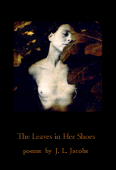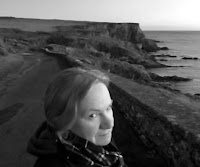Last week, Denver poets Oren Silverman, Noah Eli
Gordon, Jesse Morse, and Mathias Svalina read their poetry at MAINSITE Art
Gallery here in Norman.
The gathering was small and unpretentious. After they’d
had a pint at a local pub across the street, the poets arrived just after seven
p.m. We chatted for a few minutes before the reading began; the poet Crag Hill
gave the introduction: “these poets are stateless; they inhabit multiverses of
language…they are the future of poetry rather than the past.” The evening had a
flavor of Americana to it, not least because at one point a loud whistle from a
train passing through the middle of town interrupted Gordon’s reading. Small
talk ranged from college football to an anecdote about the four poets speeding down
Flaming Lips Alley in Bricktown the night before—windows down, blasting Flaming
Lips songs. Apparently, too, the poets had been kicked out of a hotel at midday
for no logical reason—and then promised the hotel manager’s son that “no one
from the University of Oklahoma would ever stay there again.” If only you
could’ve heard Morse tell the story.
It was clear, though, that these poets take their
work seriously, even if they differ in how they define “work” and its
relationship to “art.” The poets had been announced for a few weeks as “Denver
poets,” words which already imply a kind of school of thought. As always,
“schools” are misleading; in each poet’s work I heard differing approaches to
poetics, ethics, language. Svalina holds
the term “experimental” suspect because it borrows from science and implies a
“finding.” What we got on Saturday was undeniably not a Western-enlightened “finding.” Instead, Gordon’s "The
Next Year: did you drop this word" offered:
A
poem runs the risk
of
being meaningfully
a little case study
illustrating what
one can fit inside
We heard critiques of romanticism and nostalgia,
including that nostalgia fatal to poetics—the need to reduce a poem to a
“meaning.” Gordon seems to have proposed a history of the lyric poem in his performance
of “The Next Year,” a piece he’s described
as “pretty much an unmasking and an ars poetica in one”:
The
real
history of the lyric's
what we do with our
runoff until a garbage
truck rumbling by
wakes our bird too early
with the thought
a city's everything
outside a citizen
In Svalina’s reading, I heard playful absurdism and
a blurring of the line between prose and poetry (a line which became blurrier
as the evening wore on). Svalina’s work seemed perhaps the most sparse—not in
terms of depth or volume, but of space. The walls of the room we were in are a
blank off-white, and the room’s small silver ceiling lights scattered shadows
about the room, a perfect space to encounter “Red Plastic
Cup”,
in which a “body’s shadow flows over the asphalt / like water in my cupped
hands draining out...As if, were I able to be any thing, / I’d be a red plastic
cup.” Svalina also shared work from his newest collection The
Explosions.
In
the collective imaginary built by the four performances, an imaginary which seemed
to hold nostalgia suspect, I felt safe—perhaps because of lines like this from
“Above the Fold”:
I will hide your
grey
within my grey.
It was Ted Berrigan’s birthday, as Morse reminded
us. “When I read Berrigan, I thought, ‘I can do this,’” he said before reading
“How the Dead Gain Passage.” He shared new poems gleaned from the autocorrect
feature on cell phones. While profound, these garnered some laughs. He lent us
new geometries inspired by the grace of baseball player Eric Chavez, seeming to
answer something of Gordon’s earlier question:
Is there ever a
point in cultivating nostalgia? It's not something you water & watch grow.
It just happens, hits like a thought. No, that's something you build. I guess I
mean it's void of fulfillment, though even that's dubious ground & who'd
want to stand outside waiting for the day's instructions?
Perhaps
these questions are part of what Crag was getting at when he said these poets
are of the future, not the past. But how does one dodge nostalgia in what
appears at first glance to be a baseball poem?—this I found myself wondering
when Morse read from his “Eric Chavez Sonnets” from Alive
at the Center.
Eric Chavez in Portland
How fortunate
life lies, Eric, my neverending
birth tonight in
Portland, you on rehab
with the
Sacramento Rivercats,
I a mere nine
rows up!
I can see the
contours of your face, your brow even,
the perfect zen
in your crouch. Your precise
over-the-shoulder
release. The fundamental straightness
of your back. Is
that a little belly even?
Every move,
every pitch, every waking
high thrust of
my spirit simply yards away,
at third, all my
lost dreams realized tonight
in your paced
extension, gentle lean
slow gait,
nervous twitch, gracious act
your glove, my
heart.
It’s not really (or perhaps just more than) a
baseball poem—it’s a meditation on chance and time and precision, a celebration
of the body and its relation to all three of these elements; it’s an
exclamation of renaissance in Portland.
From each small movement of Eric Chavez spiral innumerable possibilities—“neverending
/ birth.” Perhaps here is a key element which tied together the evening’s
“Denver imaginary” and its incredible heterogeneity: a sense of possibility—where
romanticism is upset by delightful absurdity; where nostalgia, “void of
fulfillment,” is unwelcome.
Somehow the reading became an ethical experience.
There was an urgent quality to it, and not just because our finale was Silverman’s
astounding performance—his reading might as well have been a dramatic monologue
written for the stage; he spoke more than one voice and “played” more than one
role. He voiced a relationship between art and law that spoke to the world in a
way that the clearest prose will never be able to accomplish. I agree with
Morse when he says
that “a proper reading of a poem” must be “multifarious” and “continuing,” and
each poet and his work seemed to “talk” to the others, making Silverman’s final
poem not just the last piece of the evening, but a zenith of the evening’s intertextualities—a
true finale. Svalina handed me a copy of his new book as we all headed to top
off our drinks and make conversation. It was an immense privilege to have heard
these four in one sitting.




 "I don't think I've ever read a first book of poems so haunted as The Leaves in Her Shoes.
Reading these poems is like listening to snatches of song or
overhearing half-sentences, mutterings, broken chants of a lost tribe.
J. L. Jacobs assembles these shards into a startling and unforgettable
collage."
--Carol Muske
"I don't think I've ever read a first book of poems so haunted as The Leaves in Her Shoes.
Reading these poems is like listening to snatches of song or
overhearing half-sentences, mutterings, broken chants of a lost tribe.
J. L. Jacobs assembles these shards into a startling and unforgettable
collage."
--Carol Muske

